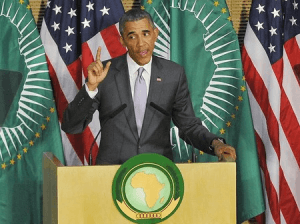White House shelves petition to end US sanctions against Sudan

The White House has shelved the petition on its website calling for the US government to end its sanctions against Sudan, which petitioners had said were “oppressing the poor and innocent”.
When the deadline of February 15 ended, the petition had recorded 117,150 signatures – thus meeting the threshold of 100,000.
But a statement on the White House website said: “This petition has been archived because it did not meet the signature requirements.”
Nothing more was said, but there had been earlier discrepancies regarding the signatures.
By February 10 the site recorded 93,752, only to come up with a figure of just over 75,000 signatures three days before the February 15 deadline.
The petition, which was first posted on January 16, read: “The poor and helpless in Sudan are bearing the brunt of the economic sanctions imposed on the country by the United States 23 years ago.
“The intended goal of the sanctions might have been to weaken the oppressive government of Sudan, but they are producing exactly the opposite result.
“They are weakening and impoverishing the people of Sudan and strengthening the grip of the regime on the country.
“We plead with president Obama to do the right and humane thing by ordering an immediate end to the Sudan sanctions.”
The petitioners were emboldened by an opinion piece published on January 14 on the website of the US magazine, Foreign Policy, which highlighted the dire plight of ordinary Sudanese people in the face of crippling US sanctions against their country.
The petitioners’ argument is that the unintended consequence of US sanctions on the living standards of ordinary Sudanese has been exceptionally severe.
They note that in key sectors such as finance, transportation, agriculture, health, and information technology there has been serious “damage to the lives and opportunities of ordinary people in Sudan to free themselves from poverty, wreaked by the US sanctions regime – including the State Sponsor of Terrorism (SST) listing”.
Their argument goes: “Even though it sees them as unjustified, arbitrary, and unfair, the government of Sudan has a moral obligation to never give up actively trying to get US economic sanctions removed.
“Sanctions invariably tend to have a direct proportional relationship with the bottom of the pyramid.
“They hurt the poor hardest. Sudan has been no exception to this rule.”
We the People on the White House website is an initiative to give greater access to citizens to petition the US president to take action on issues close to their hearts.
When it was launched in September 2011, the threshold for signatures that would warrant a response from the administration was just 5,000.
But as the website began receiving strange requests, such as secession by some states from the Union, the signature threshold was gradually ramped up until it reached the current 100,000.
The Atlantic Monthly, in an article on its website reported that the administration of President Barack Obama had come in for criticism “for selective answering and long response times”. The publication quoted a 2011 argument by J.H. Snider, a former fellow at the Edmond J. Safra Centre for Ethics at Harvard University: “We the People will likely have a short shelf life for the same reason so many political initiatives have short shelf lives: because the interests of the public and elected officials are misaligned.
“The public is inclined to ask politicians to take controversial stands that politicians have no rational self-interest in taking.”
Source: GNA

Does this actually mean that sanctions will be lifted or is this click bait?